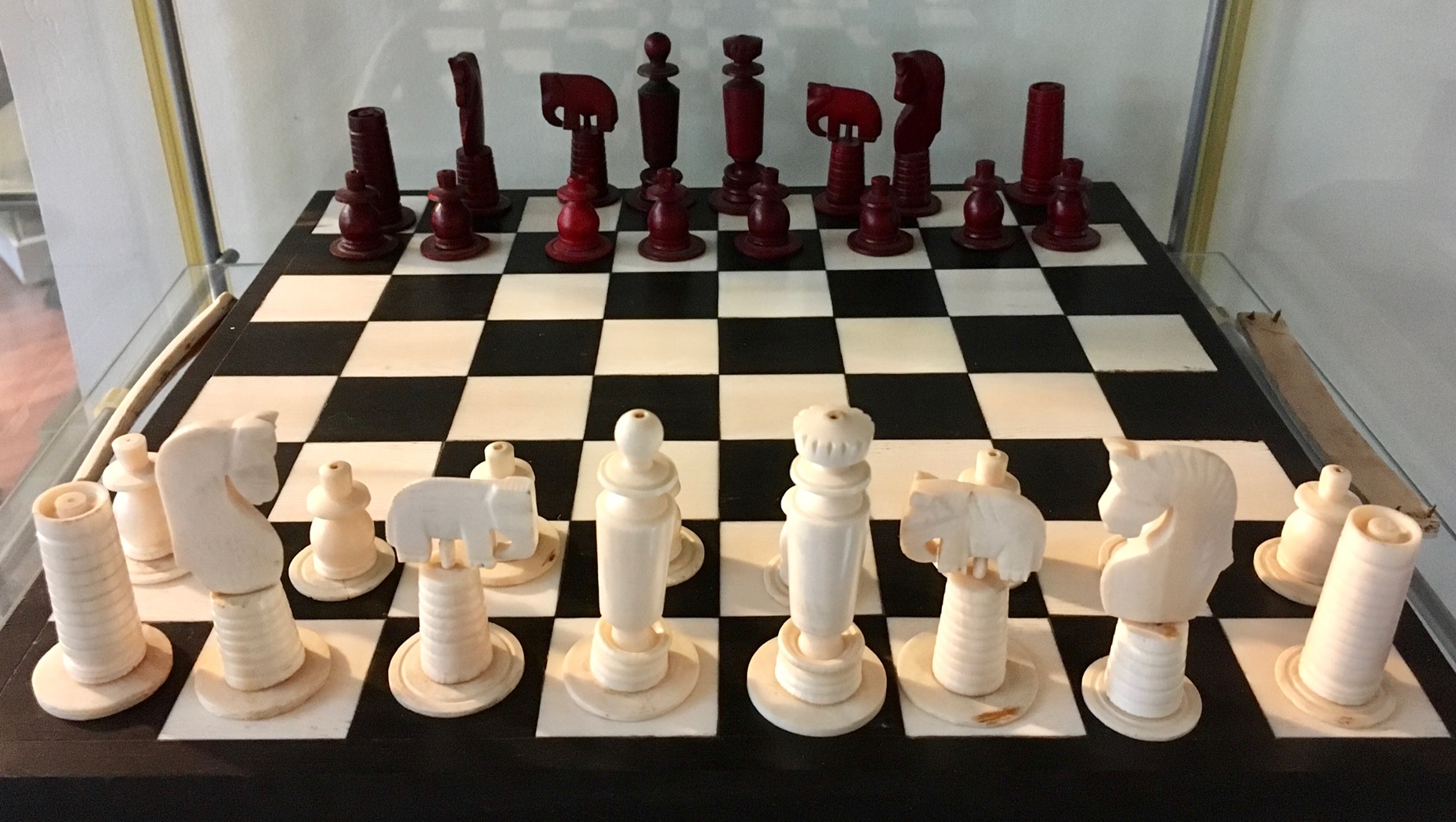May is the perfect month to put the focus on a World War II chess game or one with a similar topic. This year we are discussing King Leopold III from Belgium, a chess player who was a prisoner of war of the Germans.
In the glass showcases of the Chessmen Museum there is an ivory chess set on display, in white and dark red colours. You can clearly tell from the chess pieces that they are of an advanced age and the accompanying description states the year 1925. This antique chess set is said to have belonged to the Belgian King Leopold III (1901-1983).
Leading the troops
Leopold succeeded his deceased father Albert I in 1934. Albert had acquired an almost mythical hero status by leading the Belgian troops during the First World War (1914-1918). Leopold had always looked up to his father and did not hesitate when the Germans attacked the neutral Belgium without warning on 10 May 1940. He would lead the Belgian troops in the fight against the Nazis.
The government actually disagreed with his decision; Leopold couldn’t just start giving orders without approval from the Secretary of Defence. In the end, they gave in, on the condition that Leopold leave the country together with the government in case of capitulation.
Leopold and his troops held their ground for eighteen days against the much stronger German army. On the verge of surrender, the ministers fled to France. Leopold refused to go with them, he insisted on staying with his troops as commander-in-chief. Ultimately, and against the wishes of his ministers, he surrendered to the Germans along with his troops. He did this to save his soldiers and civilians in case the fighting lasted longer.
Unlike our Queen Wilhelmina, who had fled to London with the Dutch government, Leopold fell into the hands of the occupying forces after surrendering. As a result, his ministers considered him no longer able to represent the country and they deprived the king of his constitutional powers. In a conversation with Hitler, Leopold tried to ensure Belgium’s neutrality within the German Empire, in order to bring Belgian prisoners of war home and to achieve higher food rations for his subjects, but Hitler did not budge. For the duration of the war, Leopold left the “governing” to his exiled ministers. He had cut off all contact with them because they had accused him of dishonourable surrender.
Deportation to Germany

King Leopold III plays chess in Hirschstein castle. (Brussels, King Baudouin Memorial) This is not the same chess game, note the difference in design.
On 6 June 1944, when the Allies landed on the Normandy coast, SS-leader Heinrich Himmler ordered Leopold to be exiled to Germany. Accompanied by a heavy escort, the king reached Hirschstein castle in Saxony a few days later. This heavily guarded fortress was not a romantic home in any way. The property was in poor condition, with plaster coming down from the ceilings and rotted panelling. Leopold´s family joined him soon after and together they would live here until 6 March 1945. In addition to the servants, 74 German soldiers and their colonel Otto Lürkner also lived in the castle.
We do not know whether Leopold brought his chess game with him. However, there is a photo of the king sitting behind a chessboard during his forced stay in Hirschstein. We also know that the Belgian people sent all kinds of emergency supplies to their king in exile, via the Red Cross. They had discovered the whereabouts of the royal family. These supplies were very welcome, since rations were minimal and the royal children were even malnourished. In addition to all kinds of food, the Belgians also sent various board games, Tintin comics and toys. Perhaps the chess game in the photo was included in one of these emergency packages.
Liberty at last
The allied forces liberated Belgium in the autumn of 1944, but the heavily guarded Leopold had nowhere to go. In March, the allied troops came too close to the castle and Lürkner had to relocate the family to Austria. In Munich they got caught up in a bombing, but they weren´t allowed to take cover in a bomb shelter. Fortunately, no one got hurt and the king and his family eventually reached their final destination, a villa in Strobl, unscathed.
During their captivity, the family was completely cut off from the outside world. However, Princess Lilian, Leopold’s wife, had managed to smuggle in a radio. This way, they heard on the news about the ever advancing allied forces! Himmler gave orders to execute the royal family by shooting, but due to sabotaged telephone connections, this message never arrived. On 8 May 1945, American tanks drove through the fence of the villa. The German guards surrendered without a fight, and Colonel Wilson managed to free Leopold and his family without a scratch. For them, too, the war was finally over.



You must be logged in to post a comment.